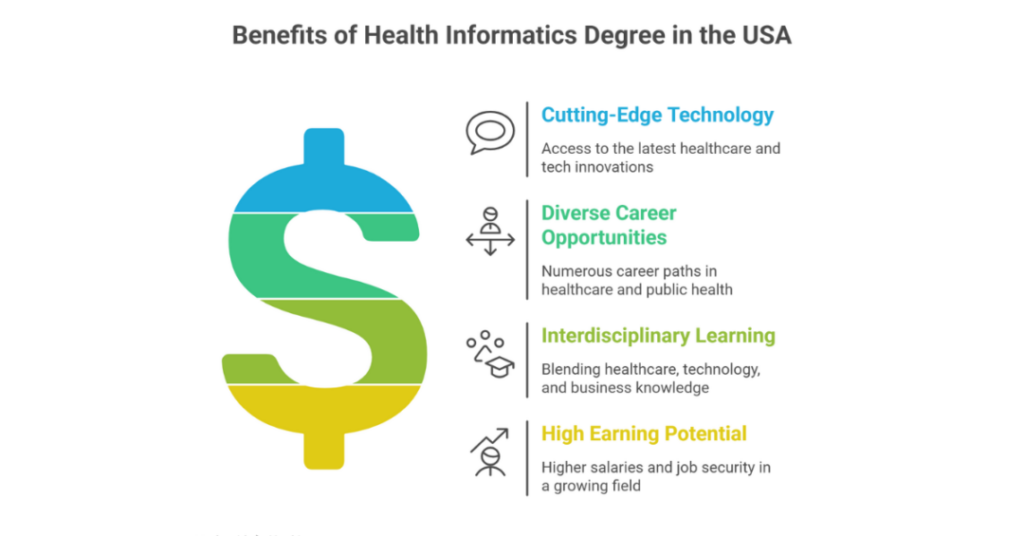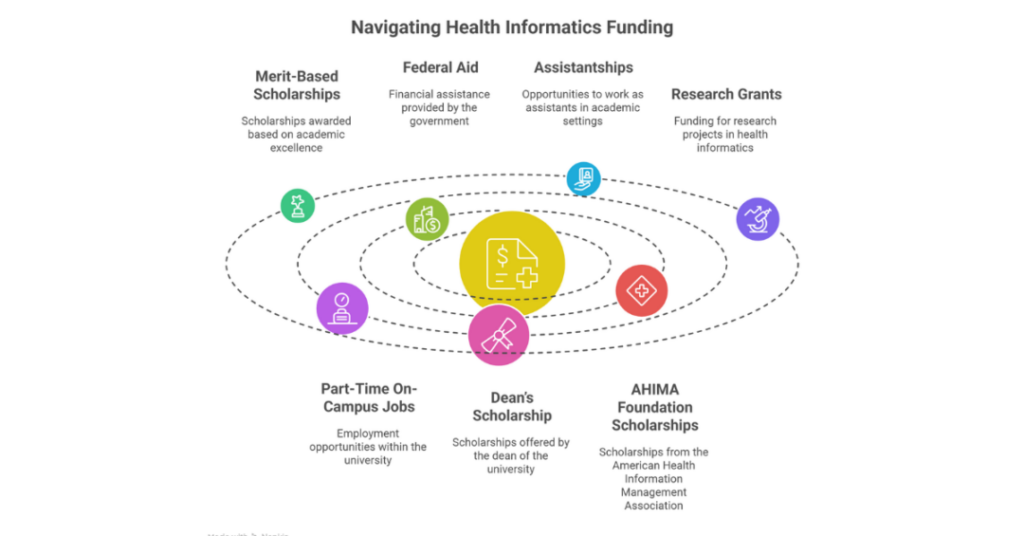8 July 2025
6 minutes read
Top 10 Health Informatics Universities in USA for Indian Students

Key Takeaways
- Selecting top health informatics universities in USA is key for leveraging advanced tech and global career opportunities.
- U.S. programs blend healthcare, tech, and business to prepare students for real-world health informatics challenges.
- Choose accredited, hands-on programs to stay competitive in the growing health informatics field.
Did you know that the global market for health informatics is projected to grow to over $120 billion by 2027? As the demand for skilled professionals in this field skyrockets, more students are looking for the right universities to help them navigate the intersection of healthcare and technology. But finding a university that offers a robust health informatics program can feel like searching for a needle in a haystack—especially with so many choices, and not all programs living up to their promises.
For many students, the harsh reality hits when they’re halfway through a degree program that doesn’t actually prepare them for the evolving landscape of health information management and data-driven healthcare. Outdated curriculums, lack of hands-on experience, and a disconnect from modern healthcare delivery systems leave students frustrated and behind in a competitive job market. The good news? Choosing the right university with a forward-thinking, interdisciplinary health informatics program can set you up for success in this rapidly growing field.
Why To Pursue Health Informatics Degree In USA?
A degree in health informatics opens doors to a future where technology and healthcare intersect, offering solutions to improve patient care, streamline healthcare delivery, and manage critical health data efficiently.

With an emphasis on blending healthcare knowledge with information technology, students in this field gain the skills needed to transform how healthcare organizations operate in an increasingly data-driven world. Here are four compelling reasons why pursuing a health informatics degree in the USA is a smart choice:
Cutting-Edge Technology
The U.S. is home to some of the world’s top healthcare and tech companies, providing students with unparalleled access to the latest innovations in health data management and information technology.
Diverse Career Opportunities
With a robust healthcare system and growing emphasis on public health, the U.S. offers numerous career paths for health informatics graduates, from hospital administration to working with electronic health records (EHR) systems.
Interdisciplinary Learning
Universities in the U.S. focus on interdisciplinary education, blending healthcare, technology, and business knowledge to ensure graduates are well-rounded and prepared for real-world challenges.
High Earning Potential
With the increasing demand for healthcare professionals skilled in information management, graduates from U.S. universities often enjoy higher salaries and greater job security in this rapidly expanding field.
10 Best Universities In USA To Study Masters In Health Informatics
The U.S. is renowned for its advanced healthcare systems and cutting-edge technology, making it a top destination for students seeking a Master’s in Health Informatics. With an increasing demand for professionals skilled in health data analytics, electronic health records management, and health information technology, the country offers some of the best health informatics programs globally, accredited by bodies like the Commission on Accreditation for Health Informatics and Information Management Education (CAHIIM).
Here’s a list of the top universities in the U.S. offering Master’s in Health Informatics programs, along with their QS rankings, average tuition fees, and average graduate salaries:
| University | QS Ranking (2024) | Average Annual Fees (USD) | Average Salary After Graduation (USD) |
|---|---|---|---|
| Harvard University | 1 | $59,800 | $100,000 – $120,000 |
| Stanford University | 3 | $54,000 | $95,000 – $115,000 |
| Johns Hopkins University | 7 | $58,000 | $90,000 – $110,000 |
| University of California, Berkeley | 10 | $47,000 | $85,000 – $100,000 |
| Northwestern University | 13 | $46,200 | $90,000 – $105,000 |
| Duke University | 15 | $51,750 | $80,000 – $95,000 |
| University of Michigan, Dearborn | 33 | $33,790 | $85,000 – $100,000 |
| Northeastern University | 40 | $34,245 | $75,000 – $95,000 |
| University of Pittsburgh | 45 | $29,300 | $70,000 – $85,000 |
| University of Utah | 51 | $13,460 | $70,000 – $85,000 |
What Are The Admission Requirements For Masters In USA?
Many prospective students face the daunting task of securing funds, proving their academic merit, and ensuring they meet all the necessary requirements to even be considered. Furthermore, students without a strong understanding of U.S. educational systems often struggle with tailoring their applications to meet the specific demands of top-tier universities.
Below is a table summarizing the typical admission requirements for a Master’s in Health Informatics or similar programs in the USA:
| Requirement | Details |
|---|---|
| Bachelor’s Degree | A 4-year undergraduate degree in a related field (e.g., Computer Science, Public Health, IT, or Healthcare Administration) with a minimum GPA of 3.0 (out of 4). |
| Standardized Test Scores | GRE or GMAT scores (waived by some universities for applicants with strong academic or professional backgrounds). |
| English Language Proficiency | TOEFL (minimum score of 80) or IELTS (minimum score of 6.5) for international students. Some universities also accept Duolingo or PTE. |
| Statement of Purpose (SOP) | A personal statement detailing your academic background, career goals, and why you’re a good fit for the program. |
| Letters of Recommendation | Usually 2-3 letters of recommendation from professors or employers who can speak to your academic or professional qualifications. |
| Work Experience | While not always mandatory, relevant healthcare or IT work experience is often preferred, especially for competitive programs. |
| Transcripts | Academic transcripts from all previous institutions attended, demonstrating relevant coursework in health informatics, IT, or related fields. |
| Application Fees | Ranges from $50 to $150 per application, depending on the university. |
Scholarships and Funding Options for Health Informatics Students in USA
Pursuing health informatics courses in USA, whether a Master of Science in Health Informatics, digital health, or medical informatics, can be a transformative step for those seeking to improve healthcare through technology and data. However, the cost of education, especially for international students, can be significant.
Thankfully, many universities in the USA offering health informatics degrees and courses provide scholarships, assistantships, and financial aid options to support graduate students, including full-time students and part-time students in programs like MS in Health Informatics and Master of Health Informatics.

Below is a detailed table of health informatics master’s programs in the USA and the scholarships or funding opportunities they offer. This includes institutions with strong offerings in clinical informatics, population health, health systems and processes, and the use of information and knowledge to promote health and improve healthcare outcomes
| University | Program Name | Scholarships & Funding Options | Key Highlights / Courses Include |
|---|---|---|---|
| University of San Diego | Health Informatics MS | Merit-based scholarships, federal aid, assistantships | Core courses in digital health, health care data, and health systems and processes |
| Stony Brook University | Science in Health Informatics Program | Graduate assistantships, research grants, part-time on-campus jobs | Required courses include medical informatics, clinical informatics, health outcomes, and information systems |
| Saint Louis University | Master of Health Informatics | Dean’s scholarship, AHIMA Foundation scholarships | Courses are available in management, health and health care services, and population health |
| Claremont Graduate University | MS in Health Informatics | Fellowships, research assistantships, government funding programs | Students are exposed to roles in health systems, program courses in data science and clinical applications |
| Northern Kentucky University | Certificate in Health Informatics / MS Degree | Scholarships for both certificate and masters of health programs; financial aid available for graduate students | Students pursuing health informatics degrees are required to complete core courses in information systems, promoting health, and health system analysis |
These graduate degree programs equip students with a deep understanding of health systems, enabling them to combine information and health domains to support government health agencies, global health organizations, and health care professionals.
Students who are currently enrolled, as well as those planning to complete a master of science degree in this field, should actively explore these funding options, as they can significantly reduce the financial burden while gaining valuable experience in health care data management, clinical informatics, and digital health innovation.
Conclusion
In conclusion, pursuing a Master’s in Health Informatics in the USA is more than just a ticket to a high-paying job—it’s a pathway to influencing the future of healthcare. With its world-class universities, access to cutting-edge technology, and growing emphasis on healthcare innovation, the U.S. offers an unparalleled environment for learning and professional development.
The blend of interdisciplinary learning and real-world application ensures that graduates are not only equipped with theoretical knowledge but also the practical skills needed to drive real change in healthcare systems.
Make Ambitio your guide to USA’s educational excellence! Learn from the best, join a global family, and dive into hands-on adventure. Your academic journey, your way – Study in USA. Dive into the success stories of students who’ve secured spots in some of the most prestigious institutions in the USA. Get inspired, compare profiles, and discover what it takes to join the ranks of these top admits.
FAQs
What is a Master’s in Health Informatics?
A Master’s in Health Informatics is a graduate program that focuses on the use of information technology and data to improve healthcare outcomes. It prepares students to manage and analyze health data, implement health information systems, and support clinical decision-making.
What are the typical admission requirements?
Admission generally requires a bachelor’s degree in a relevant field (e.g., biology, computer science), a minimum GPA (often around 3.0), proof of English language proficiency (IELTS or TOEFL), and sometimes standardized test scores (GRE or GMAT). Applicants may also need to submit a statement of purpose and letters of recommendation
How long does it take to complete the program?
Most Master’s programs in Health Informatics take about two years to complete if pursued full-time. Some institutions offer accelerated programs that can be finished in as little as 18 months, while part-time options may extend the duration to three years or more depending on course load
What courses are included in the curriculum?
The curriculum typically includes core courses such as Health Information Systems, Data Analytics, Clinical Decision Support Systems, and Security and Privacy in Health Informatics. Students may also choose electives based on their interests and career goals
What career opportunities are available after graduation?
Graduates can pursue various roles, including Clinical Analyst, Clinical Informatics Manager, and Health Data Scientist. They may find employment in healthcare organizations, IT firms specializing in health technologies, and public health agencies
Are there online options for this degree?
Yes, many universities offer online or hybrid formats for their Master’s in Health Informatics programs, allowing students to complete coursework remotely while still engaging with faculty and peers

You can study at top universities worldwide!
Get expert tips and tricks to get into top universities with a free expert session.
Book Your Free 30-Minute Session Now! Book a call now




























